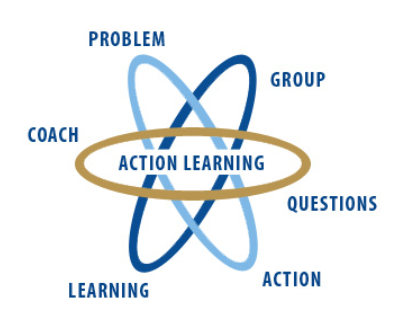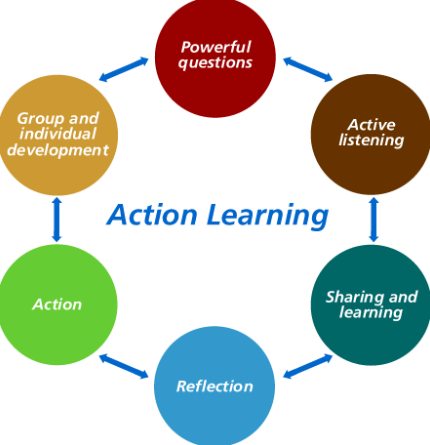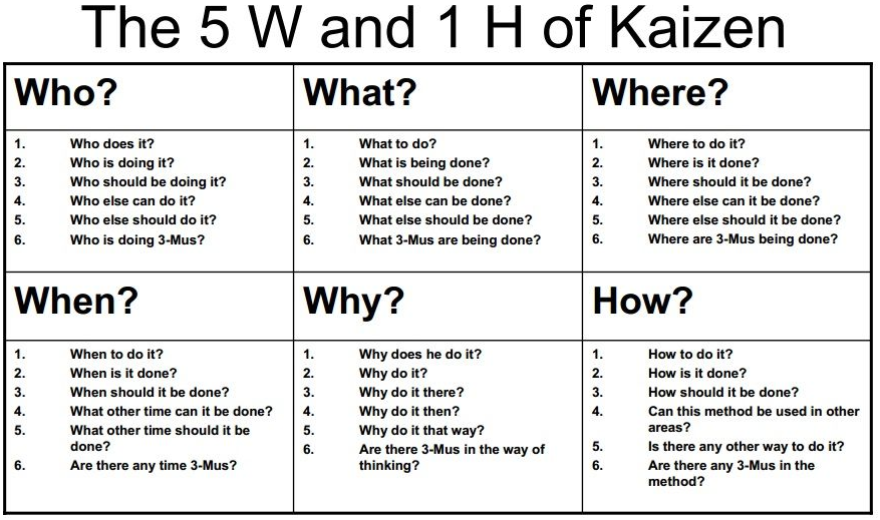Action Learning:
Learning by Doing
Experiential Education

What you will learn:
- What action learning is
- The origins and overview of action learning
- The role questions play in problem-solving
- Strategies and tools to conduct action learning
There can be no learning without action, and no action without learning
What is Action Learning?
Action learning (AL) is a problem-solving strategy and experiential learning approach where the collective wisdom of the group is utilised. In action learning a small group of people are presented with real problems that they take action on and then learn from the process and the results. People learn by doing and then reflect on what’s been learned to inform future actions.
This module will discuss the origins of AL, the benefits of utilising this problem-solving process and the skills to undertake it successfully.

Origins and Overview of Action Learning
Action learning was pioneered by Professor Reg Revans, who utilised the problem-solving strategy in coal mines and laboratories in the 1940s. Based on the positive application in these settings, he expanded its use to management development and now AL is used widely across many professional spheres. It is frequently used as an organisational development tool, often to determine the impact of operational plans and bring about organisational change.
The central idea behind AL is learning by doing. Revans (IFALOfficial 2012) believed that people who are experiencing significant problems together, or what he called ‘comrades in adversity’, can work collaboratively over a period of time to help solve the problem.
Ideally, people engaged in AL are working collaboratively in an unfamiliar space, with unfamiliar problems and maybe, even, with unfamiliar peers. This unaccustomed environment makes ‘fresh’ thinking possible where people cannot rely on perceptions, judgments, assumptions and traditional ways of solving problems (Adams 2010).
There is not one agreed upon graphic that illustrates the entire AL process, however examine the diagrams below and identify the commonalities between them.

(Action Learning Associates 2018)
(Action Learning Associates 2018)

(Tarnowski 2015)
(Tarnowski 2015)
What you may have noticed in both is the cyclical and interrelated nature of the process, the importance of the group, and the role of questions in the process. The next section details some of these ideas further as well as the skills involved in being part of the AL process.

The Action Learning Process Detailed
Revans believed that people learned best from each other in a collaborative group environment where they could problem-solve in a creative, supportive environment. He called this group an ‘action learning set’ (IFALOfficial 2012).

(Action Learning Associates 2018)
(Action Learning Associates 2018)
It is worth noting that AL does not take place in a day or even a week, it is a process which can take weeks and months. While the group aspect is critical to the endeavour, much of the time is spent working individually on the problem. In this time individuals should be acquiring knowledge (P) and raising questions (Q) to share with the group.
Revans (cited in Adams 2010) described the AL process in a formula:
Learning = Programmed Knowledge + Questions (or L = P+Q).
In the short video below Revans describes action learning’s two key components - knowledge and questions, mentioned above. Revans was filmed in 1984 and the video, created in 2012, might appear a little dated. However, the seminal ideas expressed by Revans are still relevant today.
Following the video, we will detail the importance of questions in this process.
Action Learning - Introduction by Reg Revans | 3:25 mins

Finding Solutions Involves Asking the Right Questions
As you learned in the previous section Revans (cited in IFALOfficial 2012) identifies two key aspects for those participating in the AL process:
- To ask probing questions to clarify the exact nature of the problem;
- To seek new knowledge around the issue independently (i.e. through interviews, books, articles, videos).
The first principle, asking questions, is widely seen as a critical component. In order to solve the problem being addressed everyone must be clear on what the exact nature of the problem is.
An exploratory line of questions helps clarify the problem and enrich the environment for finding solutions. A penetrating and insightful line of questioning is not just important to deconstruct the problem, but also a part of the learning and reflective process (IFALOfficial 2012; Adams 2010).
Adams (2010) stresses that questions, both interpersonal and internal, are seen as important as it ‘invigorates thinking, learning, action and results’.
To ensure a strong line of questioning, some of the following suggestions have been made:
- questions should not just look for solutions, but for deeper understanding of the issue(s);
- questions should make people think and reflect;
- ‘fresh’ questions should be encouraged, particularly those without assumptions and outside of traditional thinking
(IFALOfficial 2012)
The short video below explains the importance of questions in the AL process:
What is Action Learning? | 3:41 mins
Resources to help with the art of questioning
Adams (2010) explains the power and purpose of asking questions, stating, ‘while every human being asks questions, it takes skill and intention to use them strategically and effectively’.
Kaizen, a Japanese word that means improvement as well as a philosophy of continuous improvement, designed a useful set of questions known as the 5Ws and How. The image below offers some questions to help you get started using the 5Ws and How.

Kaizen’s 5W and H
Kaizen’s 5W and H
You may also find the graphic below helpful in the types of questions that can be asked at different stages of the AL process.

Reflective Listening
While asking the right questions is important to the AL process, so too is the ability to be a reflective listener.
What is reflective listening?
It is a communication skill whereby the listener clarifies what the speaker has communicated through re-statements. While this might seem deceptively simply, it does require the ability to:
listen more than you talk
restate and clarify and avoid asking questions
understand the feelings behind what is shared, rather than add your own feelings and beliefs
be empathetic to the speaker and views shared
Essentially, a good reflective listener demonstrates empathy, respect and open-mindedness through their verbal and nonverbal behaviour.
(Cited in http://www.analytictech.com/mb119/reflecti.htm)
The central question for the reflective listener should be ‘how does the person see the situation and themselves?’ rather than ‘what can I do for this person?’
Why is action learning a valuable problem solving strategy?
Since the 1940s action learning has been adopted by organisations and companies as an effective problem-solving strategy. Some of the reasons that it is valued include:
- High degree of ownership of actions undertaken because of collaborative nature
- Organisational change is less disruptive
- Reflective learning
- Greater staff support and buy-in
- Opportunities to share learning with colleagues
- Improves team performance
- Improves leadership skills
- Increases reflective active listening
- Develops facilitation skills
(SageWays Consulting 2014)
Benefits of participating in an AL process:
There are many benefits and skills to be gained from participating in an AL process, some of which are listed below:
- problem-solving
- collaboration
- leadership and facilitation
- opportunities to work collaboratively and develop team working skills
- question-making strategies
- active and reflective listening skills

Conclusion
In summary, action learning is a collaborative problem-solving strategy that involves a number of people working on an identified problem together. While action learning is a problem-solving process, the most important stage of it does not involve finding solutions but rather a line of insightful questioning and reflection on the actions undertaken. The emphasis is on learning by doing.
Action learning requires an empathetic, open-minded and reflective process. Skills developed during action learning include critical thinking, questioning and reflective listening.

References
Action Learning Associates 2018, Reg Revans, viewed 29 September 2018, <http://www.actionlearningassociates.co.uk/action-learning/reg-revans/>.
Adams, M 2010, ‘The Practical primacy of questions in action learning’ in Action Learning and Its application in RL Dilworth & Y Boshyk (eds), Palgrave Macmillan, London, pp. 119-130, viewed 30 September 2018, <http://www.inquiryinstitute.com/ThePracticalPrimacyofQuestionsinActionLearning.pdf>.
Hales R 2014, Fundamentals of action learning, Training Journal, accessed 30 September 2018, <https://www.trainingjournal.com/articles/feature/fundamentals-action-learning-2>.
IFALOfficial 2012, Action learning – introduction by Reg Revans, YouTube video, viewed 24 September 2018, <https://www.youtube.com/watch?v=2bJ9RXkYPSU>.
SageWays Consulting 2014, What is action learning?, YouTube video, viewed 24 September 2018, <https://youtu.be/9dUPvzGgiok>.
Tarnowski T 2015, Action learning, Play-in-Business, viewed 2 October 2015, <http://www.plays-in-business.com/action-learning>.
World Institute for Action Learning 2018, Action learning to improve organisational performance, YouTube video, viewed 24 September 2018, <https://www.youtube.com/watch?v=3-krPBKKT9A&feature=youtu.be>.
University of New South Wales 2015, Reflective listening, viewed 30 September 2018, <https://teaching.unsw.edu.au/group-work-reflective-listening>.

